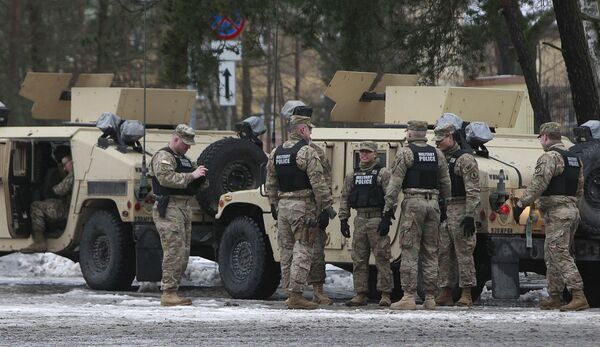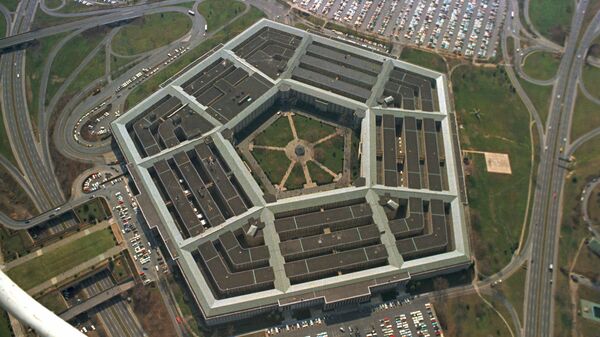"The military budget should be designed to counter actual threats, not competitors or adversaries," says Philip Giraldi, a former counter-terrorism specialist and military intelligence officer at the CIA, "The US should not be looking for enemies to fight."
US Wants to Remain the 'Predominant Military Power in the World'
On February 12 US President Trump unveiled the Fiscal Year 2019 Budget which envisages stepping up the Pentagon's spending by 13-percent from the 2017 enacted level, as the US is seeking to "remain the predominant military power in the world," and "maintain a world order that reflects America's values."
"This includes $597 billion for the base budget, and $89 billion for Overseas Contingency Operations," the document says.
The Budget specifically highlights that "long-term strategic competitions with China and Russia are the principal priorities for the Department of Defense."
The president's fiscal document stipulates that "the United States faces an increasingly competitive and dangerous international security environment, characterized by the reemergence of great power competition with China and Russia, dangerous new technologies, empowered non-state actors, and the proliferation of weapons of mass destruction."
"The United States has long had a policy of being able to fight a major war and a minor war at the same time," Giraldi told Sputnik, commenting on the newly-released budget. "That said, the policy is based on the concept that Washington must play a leadership role in the world, which is being opposed by many people including myself."
READ MORE: Ex-CIA Officer: US Defense Strategy Targets Russia, China Despite No Threat
According to the CIA veteran, the White House's objective to fight "competitors" instead of actual "threats" leads to "wasteful spending" as it "has to be repeated frequently as technology changes."

US Military Build-Up in Europe May Prompt a Similar Response From Russia
Besides, the Budget requests more than $6.3 billion for the Department of Defense's (DOD) European Deterrence Initiative (EDI) "to better counter Russian coercion and deter Russian aggression in the region."
The EDI request includes both military training of US forces together with NATO allies and partners, "especially in Eastern Europe" and maintenance of US battalion in Poland within the framework of NATO's Enhanced Forward Presence mission.
However, Giraldi dubs the proposal "bad policy."
"[It's] bad policy as it will encourage a build-up in Russia, which is not good for either country," the former CIA official stressed. "Russia has expressed no desire to expand into Eastern Europe in any event so the policy is based on poor analysis of the existing situation."
President's Budget Seeking to Boost Military Aid to Ukraine
The document also highlights the need to "increase prepositioned US stocks; modernize Army equipment in Europe; enhance the Air Force's ability to rapidly scale operations in contested environments; harden communications and logistical infrastructure"; and "catalyze front line allies' and partners' efforts to defend themselves."
It further proposes to allocate $250 million for Ukraine, to "help" the country "protect its territorial integrity."
Previously, in December 2017, the State Department approved lethal arms supplies to Kiev including for 210 Javelin missiles and 35 command launcher units (CLUs) worth $47 million under the same pretext.
Does it mean the White House seeks to return the breakaway republics of Donetsk and Luhansk to Kiev by force?
"The Trump policy seeks to given Ukraine enough military hardware to resist any additional losses of territory without enabling Kiev to take a major offensive or anything else that would be destabilizing," Giraldi responded. "There is no real desire to make worse the relationship with Russia, but Ukraine has a very strong lobby in the US Congress and the White House is responding to that pressure."

From Europe to Indo-Pacific: 'The US is Not Threatened by Anyone'
The Trump administration's plans for further military build-up in Europe and Asia-Pacific prompt fears about the possibility of new clashes and even wars in the regions. However, Giraldi recommends calming down.
"The budget will not increase the ability to start new wars as it mostly involves replacing ageing systems. Those war decisions are political in any event," the former CIA officer explained.
"I believe the spending is a waste of money, rewarding the military and government contractors without any reason to do so. The United States is not threatened by anyone," Giraldi stressed.
Federal 2019 Budget Echoes US Nuclear Doctrine
Similarly to 2019 Budget, the nuclear doctrine is targeting Russia and China in the first place, claiming that the two "have engaged in increasingly aggressive behavior, including in outer space and cyber space."
It appears that the Trump administration's trend may draw Moscow and Beijing closer together and even force them to create a full-fledged military alliance to counterbalance Washington's growing military presence in Europe and Asia-Pacific.
However, according to Giraldi it won't happen in the foreseeable future: "Russia and China will of course cooperate against the new doctrine, but an alliance is unlikely," he said.
The Nuclear Posture Review also suggests that Washington could use atomic weapons (including low-yield bombs) in response to chemical, biological, or cyber attacks. It triggers serious concerns especially in light of Russia's capability to inflict unacceptable damage to the US in case of an atomic strike.
"The doctrine is actually worse than your description as it permits the US to use nuclear weapons if any 'strategic interests' are threatened, which is much broader than cyber. It creates a very dangerous threshold for the use of nuclear weapons. It is a very bad policy," the CIA veteran emphasized.
The views and opinions expressed by Philip Giraldi, Ekaterina Blinova are those of the contributors and do not necessarily reflect those of Sputnik.






